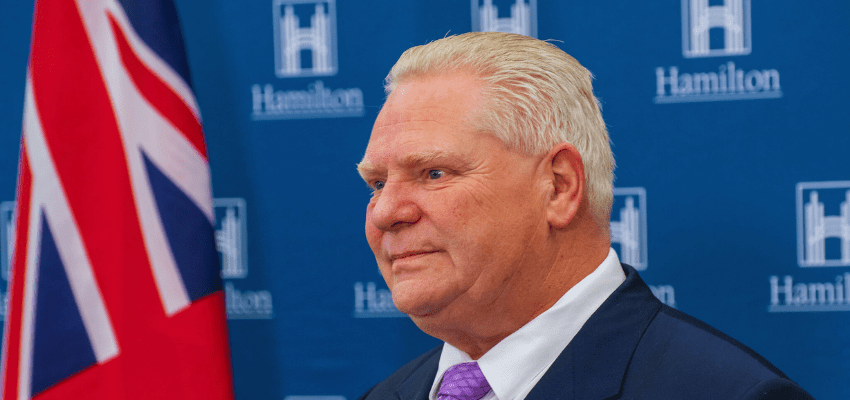This article originally appeared in the Hub.
By Peter Menzies, July 24, 2024
Given how smoothly the knife went in and out, it’s hard to blame the casual reader for failing to notice the most recent assault on the concept of media independence in Canada.
The latest footfall in its death march occurred when Ontario Premier Doug Ford ordered that a minimum of 25 percent of all provincial advertising be spent on Ontario-based media who had received Qualified Canadian Journalism Organization (QCJO) status from the federal government. This means Crown agencies like the Ontario Cannabis Store, Ontario Lottery and Gaming Corporation, and the Liquor Control Board of Ontario will be obligated to promote their products in their pages.
In a free enterprise environment, advertising dollars are spent where they get the best return on investment. The fact that so many dollars have shifted away from legacy media to social media in recent years is primarily because the latter is of greater interest to consumers and better at connecting them to products than the former. Legacy media has simply failed to provide a sufficiently competitive value proposition.
But this is Canada where lobbying for subsidies is preferred to innovation. So-called “Conservative” Premier Ford has decided that at least $25 million of his government’s annual $100 million in advertising should be spent in a non-free enterprise fashion. Those dollars are best used, according to Ford, as a subsidy for those incapable of attracting advertisers on their own. Precisely how this bonanza will be shared is unclear, but suffice to say major backers of taxpayer subsidies for media such as the Toronto Star and Postmedia expect to be recipients.
And so too could the CBC benefit—at least the English part of it, which is headquartered in Toronto. So, while federal Conservative leader Pierre Poilievre is whipping crowds into a frenzy with his “defund the CBC” mantra, Progressive Conservative Premier Ford could be “re-funding” the same CBC.
It gets better.
Flashpoint CBC personalities such as Rosemary Barton, along with Althia Raj and Bruce Arthur, who represent the progressive segments of the nation’s ideological spectrum respectively at the Star, may soon owe at least a portion of their income to the philanthropy—let’s call it what it is—of Premier Doug Ford.
The Star is obliged, through its adherence to the Atkinson Principles, to favour political movements on the left of the spectrum. It is now in the awkward position of depending upon a conservative for not just its continued existence but—apparently—the very preservation of democracy. As its report on the advertising news (which you may notice is devoid of any critical comment) stated:
“Toronto Star owner and publisher Jordan Bitove, who has called for a similar commitment from Canadian businesses, praised the government decision, saying it comes at a crucial time for the industry, and for democracy.”
“Premier Ford and his government have shown outstanding leadership in supporting Canadian-owned and operated journalism,” said Bitove. “This support will have a profound impact in ensuring Ontarians are better informed.”
Postmedia, which is not Canadian-owned, was even more excited about what the move means for the salvation of democracy and its reporters were similarly unable to find anyone critical of the move. How better to preserve democracy, after all, than by muting voices that might object to a government decision?
Indeed, the National Post was so thrilled that it featured the news on its front page. The lovefest then continued onto page two where it was accompanied by not one, but two columns. One was authored by Paul Deegan of News Media Canada. Having lobbied for this decision, Deegan was unsurprisingly filled with praise for the Ontario premier and the wisdom he had shown by doing what Deegan had asked of him.
The other column was written by the Toronto Sun’s Brian Lilley. He also saluted the intellectual prowess of his new benefactor at Queen’s Park and then took it up a notch by calling on Prime Minister Justin Trudeau to be equally wise in sustaining his employer. Deegan’s column appeared simultaneously in the Toronto Star, which is also unusual. Both publications generally only accept commentary when it is offered to them exclusively.
That same column then travelled across the province, appearing unchallenged in less well-known Ontario publications such as Halton Hills Today, Aurora Today, the Waterloo Chronicle, the North Bay Nipissing, Orillia Matters, Soo Today and more. It’s difficult to recall a time when Ford was this universally admired by his province’s editors.
Critics could easily conclude from this that the news media is willing to suspend normal journalism standards when government decisions favour their shareholders’ interests.
There are even strings attached to the deal. According to the government of Ontario news release, the directive to spend 25 percent of advertising on approved Ontario media “will be reviewed on a quarterly basis to ensure it is having the desired effect of promoting local content and culture and supporting Ontario jobs…”
Those may be virtuous goals, but that’s a pretty short leash based on clearly subjective criteria. It would be a significant break with tradition for publishers to accept advertising based on agreeing to meet specific editorial content expectations. And, given the behaviour on this development, it’s difficult to imagine the threat of the ads being pulled won’t be hanging over newsrooms.
This could also mean that Ontario-based chains will, when contemplating layoffs, prioritize dumping jobs at their properties outside of Ontario.
Freedom of the press should always mean that publishers are free to do whatever they want; that includes deciding to meet government content expectations in exchange for revenue. But it’s challenging to see how that fits within the argument that news organizations deserve access to taxpayers’ money because doing so is required to preserve democracy.
Little wonder then, that public trust in media continues to plummet. And so, the death march continues.
Peter Menzies is a senior fellow with the Macdonald-Laurier Institute, a former publisher of the Calgary Herald and a previous vice-chair of the Canadian Radio-television and Telecommunications Commission (CRTC).







